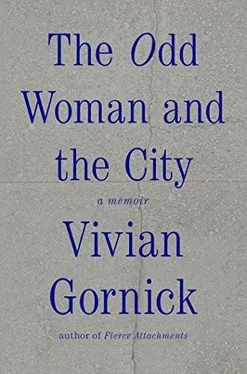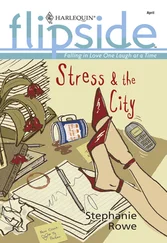On the very last day of my twenties I married a scientist, a man of brooding temperament who had taken eighteen years to complete his dissertation. His difficulty made him poetic in my eyes. He, of course, was remarkably sensitive to my own divided will. During our courtship we walked together by the hour while I discoursed ardently on why I could not get to Moscow. His eyes flashed with emotion as I spoke. “My dear girl!” he would exclaim. “My beautiful, marvelous girl. You are life itself!”
I became the interesting, conflicted personage and he the intelligent, responsive wife. The arrangement made us both happy. It felt like comradeship. At last, I thought, I had an Ideal Friend. Life seemed sweet then. Alone, I had been cramped up inside; now I felt myself breathing freely. It gave me pleasure to open my eyes in the morning and see my husband lying beside me. I experienced a comfort of the soul that I had not known before.
One morning I awoke desolate. Why, I could not tell. Nothing had changed. He was the same, I was the same. Just a few weeks before I’d awakened feeling festive. Now I stood in the shower stricken, spots of grief dancing in the air before my eyes, the old loneliness seeping back in.
Who is he? I thought.
He’s not the right one, I thought.
If only I had the right one, I thought.
A year later we were divorced.
I was still my mother’s daughter. Now she was the negative and I the print, but there we both were: alone at last with not the right one.
I did not understand until years after I’d left Gerald that I was born to find the wrong man, as were Dorothea and Isabel. That’s what we were in business for. If this had not been the case, we’d all have found some useful work to do and long forgotten the whole question of the right man. But we did not forget it. We never forgot it. The elusive right man became a staple in our lives, his absence a defining experience.
It was then that I understood the fairy tale about the princess and the pea. She wasn’t after the prince, she was after the pea. That moment when she feels the pea beneath the twenty mattresses, that is her moment of definition. It is the very meaning of her journey, why she has traveled so far, what she has come to confirm: the unholy dissatisfaction that will keep life permanently at bay.
So it was with my mother, who spent her years sighing for the absent right one. And so it was with me.
We were in thrall to neurotic longing, all of us — Dorothea and Isabel, my mother and I, the fairy-tale princess. Longing was what attracted us, what compelled our deepest attention. The essence, indeed, of a Chekhovian life. Think of all those Natashas sighing through three long acts for what is not, and can never be. While one (wrong) man after another listens sympathetically to the recital of a dilemma for which there is no solution.
Gerald and I were Natasha and the Doctor forever talking, talking, talking. Behind Natasha’s enchanting conversation lies a passivity of monumental proportion — for which the Doctor is the perfect foil. Inevitably, Natasha and the Doctor must part. They have only been keeping each other company, spending their equally insufficient intent together.
* * *
A man and a woman sitting side by side on a bus strike up a conversation. She is black, middle-aged, well dressed; he is white, also middle-aged, slightly wild-eyed. Apropos of nothing he says to her, “I’m spiritual. I’m a very spiritual person. I accept all religions. All religions are okay by me. I hold only one thing against Christianity. Why they hate the Jews for killing Christ.” The woman turns full face to him and says, “Y’know? I’ve always thought the same thing. After all, it was the Romans who killed him. Why don’t they blame the Italians?”
* * *
If life begins to feel like the sum of its disabilities, I take a walk up to Times Square — home to the savviest underclass in the world — where I quickly regain perspective. On Broadway at Forty-Third Street on a windy evening in winter, a black man on a makeshift platform is speaking into a microphone. Ranged around the platform are perhaps a dozen black men and women. The man at the mike sounds like a television broadcaster. People hunched over against the wind are rushing past him, but he goes on speaking in the smooth, imperturbable tones of the evening news anchor. “It has come to my attention lately,” he says, “that sales are up on suntan lotion and sunblock. Now who do you think are the customers for this item? I’ll tell you who. White people, that’s who. Not you or I, brother. No, it’s white people.” His voice deepens. “Now what do you think of a people who keep telling us they’re superior, and…” Without warning he pauses, his eyes squeeze shut, and he screams, “They can’t even make it in the fuckin’ sun!” Back to broadcast news. “You—” He points calmly at the heads of the fleeing crowd. “The white people. Don’t even belong. On the planet.”
* * *
When I ran into Manny Rader on Third Avenue, I hadn’t seen him in twenty-five years. He was the older brother of the girl in the neighborhood who’d been my best friend when we were twelve. After I turned fourteen, he’d begun staring at me. As soon as I saw him on Third Avenue, I knew I had to have him.
I have a penchant for men I’ve grown up with. They’re like chloroform on a cloth laid against my face: I inhale them, I burrow into them, I want to bury myself in them. When I was a kid I wanted to be them — these dark, skinny, street-smart boys with hot eyes and ignorant passions who came together every day at the top of the block to laugh, curse, and kibitz themselves into existence — I never got over not being one of them. It wasn’t that I envied them their shared act of imagination — the one they seemed to have inherited, it came so naturally to them — it was that it frightened me when I realized I wasn’t one of them, and never would be. I felt imperiled then: without world and without self.
“Who’d have thought you’d turn out a writer,” Manny said to me on Third Avenue, a bemused expression on his face. And then he laughed. “You were such a pain in the ass as a kid, always hanging around where you weren’t wanted.” His laugh brought it all back to me, made me see those feelings again as though they were standing in the air before me. He had had this rich, deep laugh I used to hear when I’d pass the boys standing on the corner. Only his friends had made him laugh like that, never the girls.
We fell into bed and astonished ourselves with a strong, sweet happiness neither of us could have dreamed was coming. One afternoon when we were making love, I went down on him. As I came up I said, “The dream of every boy in the Bronx, that the girl down the street will suck him off.” Manny lay back on the bed and laughed that unguarded, in-the-world laugh of his. It thrilled me more than anything our bodies were doing together. I stared at the wall beyond his head, thinking, I’m safe. Now he’ll never leave me. But of course I didn’t really think Manny was going to do the leaving; if anything, it would be me who skipped.
He had walked away from everything but the women all his life. He’d gone to college on a scholarship, then left in his third year to join the army; he’d entered business with a known embezzler, and within two years the business had gone under; he rose from technician to researcher in a biology lab, then got into a fight with his boss and quit; he worked on a large national magazine where he was quickly made reporter, then editor, and then fired because he disappeared for a week without explanation. On the block he was written off as a congenital fuckup. “He can’t find himself,” his mother moaned. “That’s a nice way of putting it,” his father sneered.
Читать дальше












